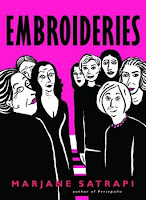
Image via Wikipedia
What do a wheel rut, a flash of lightning and a dining table have in common?
Medical Terminology. Ever think about how a doctor in New York can speak to a doctor in Japan about medical matters. They use the same medical words. I found this fascinating, and hope you will, as well.
I’m also a Jeopardy fan. For those of you unfamiliar with this TV format, a contestant is presented with the answer, and must deliver the definition to win a prize.
So…..here it is. It’s a medical jeopardy. Here are 127 questions.
If you’re in the medical or health care field, chances are you’ll have no trouble with most of these, The object here is to present to you the oddities of linguistic evolution.
WARNING: DO NOT USE THE MATIERIAL IN THIS ARTICLE AS PRIMARY SOURCE MATERIAL (although you might be tempted). This is simply because much of what is known about language derivatives is assumed - not fact.*
Answers are presented on the last page.
1. FINE POWDER: from the Arabic “al” (the) and koh l “fine impalpable powder.”
2. RUT MADE BY A WHEEL: From the Latin, “orbita.”
3. TO MAKE STICKY: From the Latin, “viscare.”
4. PERTAINING TO THE FORUM: From the Latin “forum.”
5. CAUSE OF DWARFISM: Long bones do not grow. From Greek “a” absence, “chondrus” (cartilage) and “plassein” (to form).
6. BULK OR MASS; From the Greek, “ongkos.”
7. TO INCREASE: From the Indo-European, “aweg.”
8. INSENSITIVITY TO PAIN: from the Greek “an” (without) and algesis (sense of
pain).
9. KNOT or KNOB: From the Latin, “nodus.”
10. AN AIR DUCT: From the Greek “aer” (air) and “tereo” (I keep).
11. NOSE or SNOUT: From the Greek, “mukter.”
12. A SHEPHERD’S PIPE: From the Greek, “syringx.”
13. DULL TO PERCEPTION: from the Indo-European root, “dheubh,”
14. ONE-HALF OF THE SKULL: From the Latin, “hemicrania.”
15. LIKE A STRAIGHT SWORD: From the Greek, “xiphos.”
16. TO BLOCK or PLUG: From the Latin, “obsterix.”
17. TO BOIL OUT: From the Greek, “ek-“ (out) and “zeein” (to boil).
18. CRECENT-SHAPED: From the Greek, “meniskos.”
19. A PRICK OR PUNCTURE BY A NEEDLE: from the Latin “acus” (needle) and
“punctum” puncture.
20. FLASH OF LIGHTNING: From the Latin, “fulgor.”
21. BREAST-LIKE: From the Greek, “mastos” and “eidos.”
22. THORN or PRICKLY BUSH: From the Latin, “spina.”
23. PRODUCE OR BRING FORTH: From the Greek, “gennao.”
24. ONE WHO HEALS: From the Anglo-Saxon, “laece.”
25. DRY, ACRID: From the Indo-European, “ters.”
26. TRANSPARANT STONE or CRYSTAL: From the Greek, “hyalos.”
27. CHEW: From the Anglos-Saxon, “ceowan.” (noun)
28. LIGHT GREENISH-YELLOW: From the Latin, “galbinus.”
29. WITHOUT WEIGHT or LIGHT: From the Sanskrit, “ laghu.:”
30. A CUTTING UP: from the Greek “ana” (up or through) and “tome” (a cutting).
31. GATEKEEPER: From the Greek, pyle.”
32. A COVERLET or CLOAK: From the Latin, “pallium.”
33. MINT: From the Latin, “menthe.”
34. WITHOUT A NAME: From the Latin, “innominatus.”
35. A DINING TABLE: From the Greek, “trapeze.”
36. CENTER OF WHEEL HUB: From the Anglo-Saxon, “ nafe.”
37. A TRENCH OR ABYSS: From the Old English, “grynde.”
38. AN OFFSHOOT: from the Greek “apo” (from) and “physis” (growth).
39. ATTACK or INJURY: From the Latin, “laesia.”
40. SERVICE or ATTENDANCE: From the Greek, “therapeia.”
41. BELONGING TO A WALL: From the Latin, “parietalis.”
42. SEEING FOR ONESELF: from the Greek “auto” and “opsis” (seeing).
43. JUICE, SAP, RESIN OR GUM OF A TREE: From the Greek, “opos.”
44. SILVERY SWELLING: From the Greek, “glaukos” and “oma.”
45. TO STRETCH: From the Greek , “teinein.”
46. TO DISGRACE, TO FALL SHORT OF: from the Latin “degenerare.”
47. PIMPLE: From the Greek, “pomphos.”
48. A NUT OR ACORN: From the Latin. “glandulus.”
49. TO SCRAPE OR SCRATCH: From the Latin, “radere.”
50. LARGE STONE IN FRONT OF DOOR TO KEEP IT SHUT:
From the Greek, “thyreos.”
51. FLAME OR HEAT: From the Greek, “phlegma.”
52. PAUNCH or BELLY: From the Greek, “gaster.”
53. FUNNEL: From the Latin, “infundere.”
54. YOKE CONNECTING TWO ANIMALS: From the Greek, “zygon.”
55. TO PLEASE: From the Latin, “placere.”
56. TO BEND OR TURN: From the Latin, “flectere.”
57. EARTH OR LAND: From the Latin, “humus.”
58. HEALING OINTMENT: From the Anglo-Saxon, “sealf.”
59. TO SEND FLUID IN: From the Greek, “en” (in) and “ienai” (to send).
60. TO DYE, STAIN, CORRUPT or BOIL: From the Latin, “inficere.”
61. A PRUNING: from the Latin “amputatio.”
62. WORKING WITH THE HANDS: From the Greek, “ cheirourgia.”
63. A FLOWING SEED: From the Greek, :”gone” and “rheos.”
64. RELATING TO THE SPHINX
65. HOLY or CONSECRATED: From the Latin, “Sacer.”
66. TWELVE FINGERS: from the Greek, “dodek-daktulon.
67. STIFF or STRONG: From the Anglo-Saxon, “stark.”
68. A COCK’S SPUR: From the old French, “argot” (rye plant infected by fungus.”
69. AFFLICTED WITH SPOTS: From the Old High German, “masa” and
Middle English, “mesel.”
70. TO BE ASHAMED: From the Latin, “pudere.”
71. TO WIND OR CURVE: From the Latin, “sinuare.”
72. A CIRCULAR OR FLAT STONE: From the Greek, “discos.”
73. PAIR OF FOLDING or DOUBLE DOORS: From the Latin, “valvae.”
74. A TURBAN: From the Latin, “mitra.”
75. LACK OF NOURISHMENT: from the Greek “a-“ (without) and trophe
(nourishment).
76. FORTY: From the Latin, “quadraginta.”
77. MASS OF MOLTEN IRON: From the Latin, “strictura.”
78. A STING OR ITCH: From the Latin, “urtica.”
79. TO TEACH: from the Latin, “docere.”
80. TO SWELL or RIPEN: From the Greek, “ orgainein.”
81. TO TAKE AWAY COLOR: From the Old French, “desteindre.”
82. WITHOUT PULSE: from the Greek “a” (without) and “sphyxis” (pulse).
83. CORRUPT MATTER: From the Greek, “Pyon.”
84. LIE ON OR BROOD: From the Latin, “incubare.”
85. LOVE, HONOR, DESIRE: From the Sanskrit, “wan” and “van.”
86. MORE, SHIFT, CHANGE or ALTER: From the Latin, “mutare.”
87. TO APPRAISE: From the Latin, “taxare.”
88. OPEN SPACE, COURTYARD OR PARK: From the Latin “area.”
89. POUCH: From the Norman French, “poque.”
90. A TAILOR: From the Latin, “sartor.”
91. WALKING HOSPITAL: from the French “hopital ambulant.”
92. BARK OF A TREE: From the Peruvian Indian, “kina.”
93. LITTLE BEAK: From the Anglo-Saxon, “nib.”
94. TO WEAVE: From the Latin,”textere.”
95. BOWL or SHELL: From the Nordic, “Skal.”
96. RUPTURE or HERNIA: From the Greek, “kele.”
97. TO ROLL OR TURN AROUND: From the Latin, “volvere.”
98. A BLOW OR STROKE: From the Latin, “ plege.”
99. SORE THROAT: from the Latin “angere” (to choke or throttle).
100. LITTLE BALL: From the Latin, “pilula.”
101. POUCH OF LEATHER: From the Latin, “scorteus.”
102. WHORL, EDDY or TORNADO: From the Latin, “Turbo.”
103. CLEAR WATER: From the Latin, “lympha.”
104. LITTLE NET: From the Latin, “rete.”
105 ANYTHING SCOOPED OUT: From the Greek, “skaphe.”
106. ROUGH: From the Greek, “traxus.”
107. LOSS OF MEMORY: from the Greek “a” (without) and “mensis” (memory).
108. A SQUEAKING: From the Greek, “trismos.”
109. A COOKING: From the Latin, “pepsis.”
110. UNCUT or INDIVISIBLE: from the Greek “a-“ (without) and “temnein” (to cut).
111. PEAR-SHAPED: From the Latin, “pirum” and “forma.”
112. A HOOK: From the Latin,”uncus.”
113. DIFFERENT WORK: from the Greek “allo” (other or different) and “ergon (work).
114. SEAT OF REASON OR PASSION: From the Greek, “phren.”
115. TO WRING OUT: From the Old French,”expraindre.”
116. A FOOTPRINT: From the Latin, “vestigium.”
117. BLADDER or BAG: From the Latin, “vesiculum.”
118. SMALL ENDOCRINE GLANDS ON KIDNEYS: from the Latin “ad” (toward) and
“renes” kidneys.
119. A POUNDER: From the Latin, “pistillum.”
120. TO ACCUSTOM: From the Anglo-Saxon, “wenian.”
121. TUB or TROUGH: From the Greek, “pyelos.”
122. ARTICULATION OF ULNA AND HUMERUS: A punster’s definition.
123. PERTAINING TO NATURAL LAW: From the Greek, “physikos.”
124. THE TASTE OF ACID: from the Latin “acidus” (sour, tart).
125: A PUSH OR IMPULSE: From the Greek, “osmos.”
126. SPROUT, BUD or OFFSHOOT: From the Latin, “germen.”
127. A COW: From the Latin, “vacca.”
*Thanks to:
Stedman’s Medical Dictionary , 26th Edition
Dorland’s Illustrated Medical Dictionary, 24th Edition
Gray’s Anatomy (any library edition).
The Language of Medicine, 4th edition, Davi-Ellen Chabner
Medical Meanings, Harcourt Brace Jovanovich, 1984
—————————————————————————————————————-
1. Alcohol2. Orbit
3. Viscus
4. Forensic
5. Achondroplasia
6. Oncology
7. Waist
8. Analgesia
9. Node
10. Artery
11. Mucus
12. Syringe
13. Deaf
14. Migraine
15. Xyphoid
16. Obstetrics
17. Eczema
18. Meniscus
19. Acupuncture
20. Fulguration
21. Mastoid
22. Spine
23. Gene
24. Leech
25. Thirst
26. Hyaline
27. Jaw.
28. Jaundice
29. Lung
30. Anatomy
31. Pylorus
32. Palliate
33. Menthol
34. Innominate
35. Trapezius
36. Navel
37. Gum
38. Apophysis
39. Lesion
40. Therapy
41. Parietal
42. Autopsy
43. Opium
44. Glaucoma
45. Tendon
46. Degenerate
47. Papule
48. Gland
49. Rash
50. Thyroid
51.Phlegm
52. Gastric
53. Infindibulum.
54. Zygomatic
55. Placebo
56. Flex
57.. Human
58. Salve
59. Enema
60. Inflammation.
61. Amputation
62. Surgery
63. Gonorrhea
64. Sphincter (interesting story)
65. Sacrum
66. Duodenum
67. Starch
68. Ergot
69. Measles
70. Pudenda
71. Sinus
72. Disc
73. Valve
74. Mitral
75. Atrophy
76. Quarantine
77. Stricture
78. Urticaria.
79. Doctor
80. Orgasm
81. Stain
82. Asphyxia
83. Pus
84. Incubate
85. Venereal/Venus
86. Mutate
87. Taste
88. Areola
89. Pox
90. Sartorius
97. Ambulance
92. Quinine
93. Nipple
94. Tissue
95. Skull.
96. Keloid.
97. Vulva
98. Plague
99. Angina
100. Pill
101. Scrotum
102. Turbinate.
103. Lymph
104. Reticulum
105. Scaphoid
106. Trachea
107. Amnesia
108. Trismus
109. Pepsin
110. Atom
111. Piriform
112. Uncinate/unciform
113. Allergy
114. Phrenic
115. Sprain
116. Vestige
117. Vesicle
118. Adrenal
119. Pestle
120. Wean
121. Pelvis
122. Funny Bone (gotcha!)
123. Physician/physics
124. Acrid
125. Osmosis
126. Germ
127. Vaccine





























Mukhtaran Bibi, better known as Mukhtar Mai.
She is absolutely inspiring.
DING!!!DING!!!DING!!!
I watched a documentary about her. She's brave and inspirational.